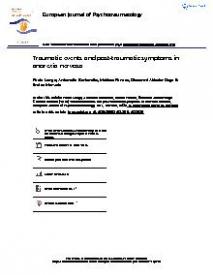Traumatic events and post-traumatic symptoms in anorexia nervosa
Background: Traumatic Events (TEs) are often seen as risk factors not only for the development of eating disorders (EDs) but also for their impact on the severity of clinical presentation and psychiatric comorbidities.
Objective: This study aimed to assess the prevalence and time of occurrence of TEs in the two subtypes of anorexia nervosa (AN; restricting [RAN] and binge-purging [BPAN]) and to investigate differences in TEs (number, type, frequency) as well as clusters of post-traumatic symptoms and emotional dysregulation between the two groups.
Method: Seventy-seven hospitalized women were recruited and divided into two subgroups according to their AN subtype. Participants completed the following self-reported measures: Eating Disorder Inventory-2 (EDI-2), Life Events Checklist (LEC), Impact of Events Scale-Revised (IES-R) and the Difficulties in Emotion Regulation Scale (DERS).
Results: A higher occurrence of TEs was found in patients with BPAN than in those with RAN. In particular, there were significantly more women in the BPAN group than in the RAN group who had been sexually assaulted. Exposure to TEs happened before the onset of illness in most patients, regardless of the AN subtype. Finally, the BPAN group had significantly higher scores in terms of post-traumatic symptoms and emotional dysregulation than RAN patients.
Conclusions: Patients with BPAN showed a higher occurrence of TEs, post-traumatic symptom clusters, and emotional dysregulation than those with RAN. These findings are of interest as treatments could benefit from trauma-informed interventions for those affected by AN, and particularly for those with the binge-purging subtype.
Geachte bezoeker,
De informatie die u nu opvraagt, kan door psychotraumanet niet aan u worden getoond. Dit kan verschillende redenen hebben,
waarvan (bescherming van het) auteursrecht de meeste voorkomende is. Wanneer het mogelijk is om u door te verwijzen naar de bron
van deze informatie, dan ziet u hier onder een link naar die plek.
Als er geen link staat, kunt u contact opnemen met de bibliotheek,
die u verder op weg kan helpen.
Met vriendelijke groet,
Het psychotraumanet-team.
In: European Journal of Psychotraumatology, ISSN 2000-8066 | 10 | 1 | 1682930
https://doi.org/10.1080/20008198.2019.1682930


